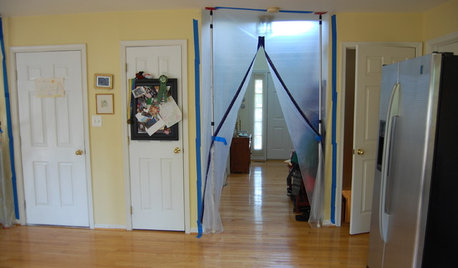Rationing during WWII. Can you tell me what you know?
User
12 years ago
Related Stories

HEALTHY HOMEWhat to Know About Controlling Dust During Remodeling
You can't eliminate dust during construction, but there are ways to contain and remove as much of it as possible
Full Story
LIFETell Us: Do You Know How to Live With Your Parents?
If you've tried multigenerational living under one roof, we'd love to hear the details
Full Story
HOUSEKEEPING10 Chores You Can Whip Through During Commercials
Use ad time for getting tasks done, and it’s like fast-forwarding your house into cleanliness
Full Story
LIFEThe Polite House: How Can I Tell a Construction Crew to Pipe Down?
If workers around your home are doing things that bother you, there’s a diplomatic way to approach them
Full Story
KITCHEN DESIGNHouzz Call: Tell Us About Your First Kitchen
Great or godforsaken? Ragtag or refined? We want to hear about your younger self’s cooking space
Full Story
LIFE10 Ways to Cope With Grief During the Holidays
If you are experiencing loss, take it from an experienced griever — life has changed forever, but it does get better
Full Story
LIFE10 Ways to Work Through Grief Triggers During the Holidays
A year after losing her sister, she was facing another holiday. Here’s how one woman learned to find joy again
Full Story
ARCHITECTUREDesign Workshop: Materials That Tell a Story
See how wood, concrete and stone convey ideas about history, personal taste and much more
Full Story
VALENTINE’S DAYTell Us: Why Did You Fall in Love With Your House?
What was it about your house that made your heart flutter? Share your photo, and it could make the Houzz homepage
Full Story
LIFETell Us: What Made You Fall for Your Kitchen?
Show the heart of your home some love for Valentine’s Day
Full Story




carol_in_california
nanny98
Related Discussions
Rosa sinensis --please tell me what you know about it?
Q
Can you all tell me what you are using for cages?
Q
Dryvit--tell me what you know.
Q
Tell me what you know about Pink Eye
Q
marie_ndcal
gadgets
minnie_tx
monica_pa Grieves
sylviatexas1
sheilajoyce_gw
linda_in_iowa
phyllis__mn
jae_tn2
UserOriginal Author
jae_tn2
minnie_tx
marie_ndcal
wildchild
Georgysmom
minnie_tx
UserOriginal Author
jemdandy
sheilajoyce_gw
kathy_
gemini40
UserOriginal Author
minnie_tx
jannie
jae_tn2
phyllis__mn
donna37
UserOriginal Author
User
bengardening
sue_va
nanny98
UserOriginal Author
chisue
chisue
User
UserOriginal Author
jemdandy
susanjf_gw
UserOriginal Author
minnie_tx
nanny98
bengardening
UserOriginal Author